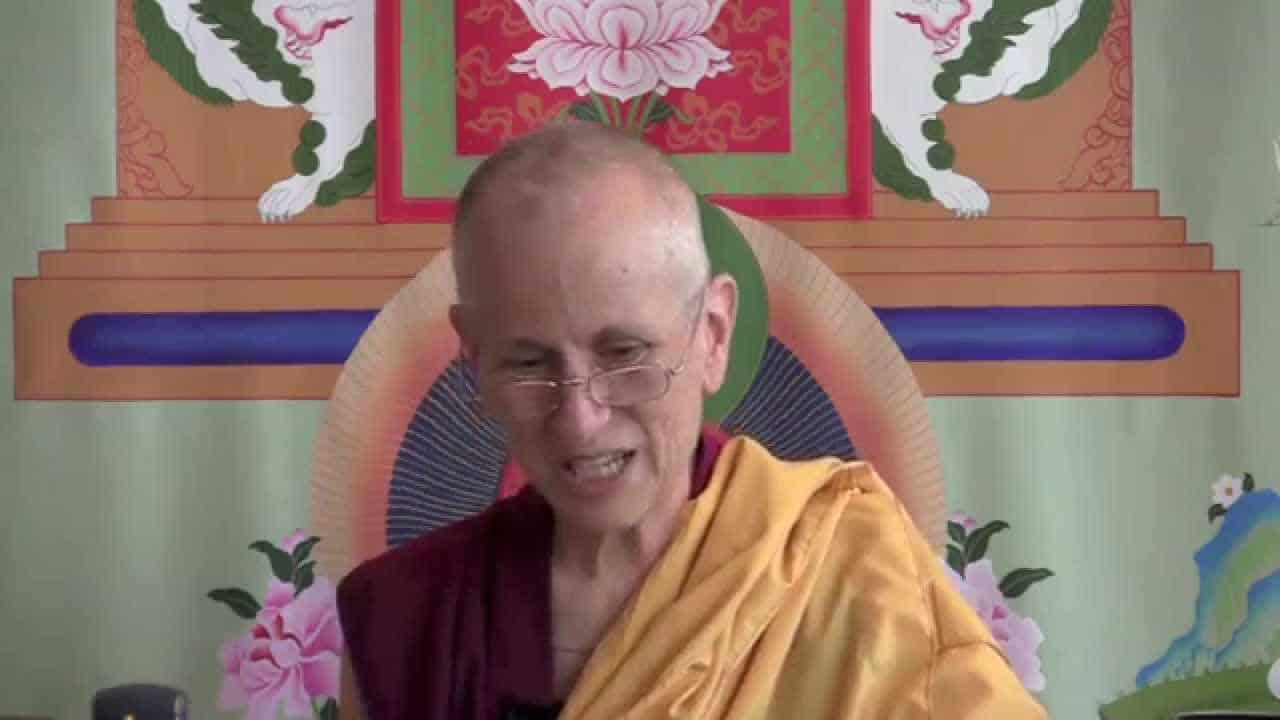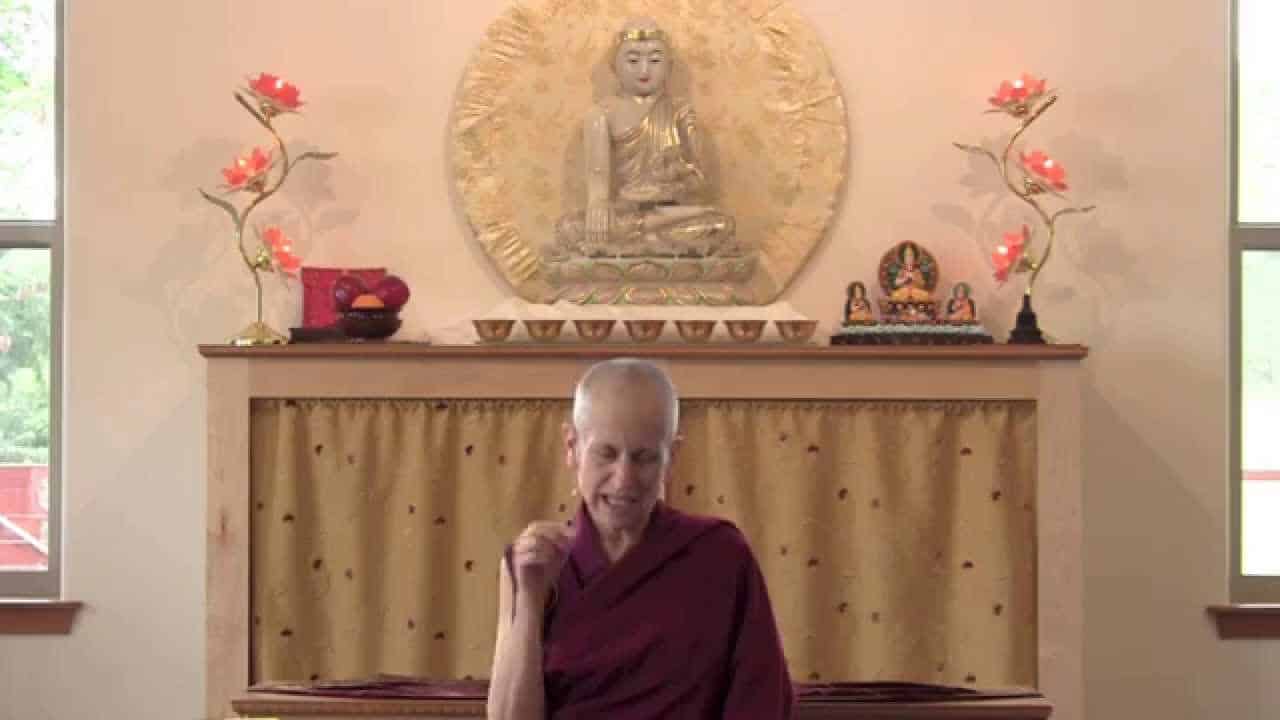Verse 88: Seeds of joy
Part of a series of talks on Gems of Wisdom, a poem by the Seventh Dalai Lama.
- The collections of merit and wisdom
- Distinguishing factor between those on bodhisattva path and those on hearer/solitary realizer path
- Importance of purification and creation of merit
- Practices to purify and create merit
Gems of Wisdom: Verse 88 (download)
Verse 88,
Who holds in their hands the seeds of every joy?
Those with vast stores of goodness the source of everything sublime.
“Vast stores of goodness” refers to the collection of merit. On the bodhisattva path we talk of the collection of merit and the collection of wisdom. Collection of merit: merit basically means “good karma,” and so that is what leads to the form body of a buddha. And the collection of wisdom is what leads to the truth body of the Buddha. So we need both of those collections in an integrated way.
They say that only a bodhisattva has the actual two collections. That even somebody on the hearer or solitary realizer path, they create merit, they create wisdom, but to be the collection of merit or the collection of wisdom it has to be done with a bodhicitta motivation. So that’s a very important distinguishing factor.
Just in our lives in general, no matter what vehicle you practice (Hearer, Solitary Realizer, or Bodhisattva Vehicle) merit is really important. That’s why in the Tibetan tradition we have the ngondro (or preliminary) practices that are specifically for purification and creation of merit. Purification is like getting rid of the garbage in the mind, the negative karma, and creation of merit is like putting fertilizer in and enriching the mind.
It’s very important to do these two practices. If you look at what we usually do as our daily practice both of these are included. For example, in the seven-limb prayer you have seven different branches and some are more on the side of creating merit, some are more on the side of purification. They all do both. But we have this in our daily practice a lot, and so you have that just regularly in whatever recitations you do before a meditation session or during a meditation session. And then you also have special practices like the 35 Buddhas, Guru Yoga, Vajrasattva, water bowls, Dorje Khadro, Samayavajra, mandala offerings, prostrations, and tea-tsas (making the images of the Buddha). So you have those. That’s the complete set of eight. No, there should be nine. Oh yes, refuge. That’s the complete set of nine. Some traditions emphasize four, some emphasize five, which are taken out of those nine, and then some your teachers want you to do all nine of them.
I think it’s very important for us to do these practices, in the sense of doing 100,000 of them, because they really are a focused effort of purification, and that focused effort makes you–for example, when you’re emphasizing 35 Buddhas or Vajrasattva–it really makes you look deeply into the negative karmas you’ve created and really do a life review and understand karma better, and go into it. And so it’s very helpful with that, when you do it in a focused way. Similarly when you do the 100,000, again that’s adding focus, some quantity to it, so it’s really making you think about “Well how do I create goodness, how do I create merit. What is merit. How do I behave and act in a way that is virtuous in the world.” It really helps on many different levels to do the 100,000.
Also, I think—and I say this more from a feeling of my own personal experience—that when you do these practices they really do eliminate hindrances, and they really do make it so that even in this life you have better conditions to practice in. If I just look at my own life–because my teachers had me do these practices, I’ve done eight of the nine, and I can see just in my ability to practice both mentally and in terms of having the material things I need to practice, that that’s really changed from the early days until now. And I attribute that to changing the karma through doing purification and creation of merit. It just makes it much easier to practice when you have fewer hindrances. Of course, transforming your hindrances into practice is the whole thing of thought training. But if you can avoid the hindrances to start with it also is nice. So these practices are very very good in doing that.
And they also change your mind. They change your mind. They make you think, “I’m doing this 100,000 times, why in the world am I doing this practice? And why 100,000 times?” It’s 100,000 opportunities to do it once with kind of concentration and bodhicitta motivation like that. Because so often our mind is just totally distracted. But it’s a good opportunity to really think about this. And to be able to focus our mind on what our mouth is saying so that saying things isn’t just blah blah blah, but you’re really thinking about what you’re saying and meditating on it while you’re saying it. So it trains the mind to do that as well.
It makes you think also about the qualities of the Buddha. It makes you understand and question more about karma. Like I said before, looking at our own lives and seeing what we have to purify and what we have to avoid in the future. So very helpful for all these kinds of things. And then when we do … then you hold in your hands the “seeds of every joy.” Because merit (good karma) is the source of happiness.
It’s important to remember that. When we go through difficulties and our mind is unhappy to remember “Oh, this is a result of my negative karma (that I haven’t purified), and my lack of virtue. So what have I been doing that I haven’t purified and I haven’t created virtue? Mmmm, I’ve been reading comic books….” [laughter] “I’ve been….” Whatever it is we’ve been doing. [Response to audience] Oh yes, looking for the pills that are going to change our mind. Yes. So it’s very helpful to remind us to practice.
[In response to audience] That’s what I mean. They say with bodhisattvas that when they practice (let’s say) giving their body or doing all sorts of bodhisattva deeds that are very difficult they don’t suffer physically because of their merit and they don’t suffer mentally because of their wisdom. So there’s a clear example of how creation of merit and purification, and the two collections of merit and wisdom, eliminate obstacles and speed your ability to create more merit and create more wisdom. And enable you to really get into the bodhisattva practices without experiencing great suffering, even though you’re totally willing to experience great suffering. Yes? Whereas those of us who aren’t willing to experience great suffering don’t even do the practices that create so much merit and so much purification.
[In response to audience] When we do these practices of purification and creation of merit, if we visualize all sentient beings doing them with us (like we do when we do the recitations at the beginning of the “Easy Path” teachings), so what effect does it have on us, what effect does it have on others.
It affects us a lot because we realize that “Gee, my practice isn’t all about me.” Which is one of the big things we have to overcome is “what’s good for my Dharma practice, what I want to practice, what I need. I need these conditions, I don’t need those conditions….” So it gets us over that thing of “oh, my practice is really for all sentient beings,” and it helps us to feel connected to all sentient beings and to have a much clearer motivation of compassion for everybody. And really that thing of including everybody transforms our minds a great deal because sometimes we may be angry at somebody and we just give up on them: “Oh, this person is…. They’re a terrorist, just forget them.” Or, “They’re Ted Cruz….” Whoever it is. But you put them beside you and they’re bowing to the Buddha, and then you have to say, “Oh these people have the opportunity to change. And they have the buddha nature. They’re not some kind of concrete, flat, one dimensional person that I’ve constructed out of one action that they’ve done. But they’re a whole full being. So it really changes our perspective on sentient beings.
And how does it influence others? I think in a way it sends out a lot of good energy from us. I mean when we dedicate the merit for the benefit of others we’re sending out some good energy that can hopefully benefit others.
Do it yourself. Do a session where you just imagine yourself, then do a session where you imagine leading others and you’re all doing the same thing, and then see what the difference is yourself, the difference in your feeling.
Venerable Thubten Chodron
Venerable Chodron emphasizes the practical application of Buddha’s teachings in our daily lives and is especially skilled at explaining them in ways easily understood and practiced by Westerners. She is well known for her warm, humorous, and lucid teachings. She was ordained as a Buddhist nun in 1977 by Kyabje Ling Rinpoche in Dharamsala, India, and in 1986 she received bhikshuni (full) ordination in Taiwan. Read her full bio.


